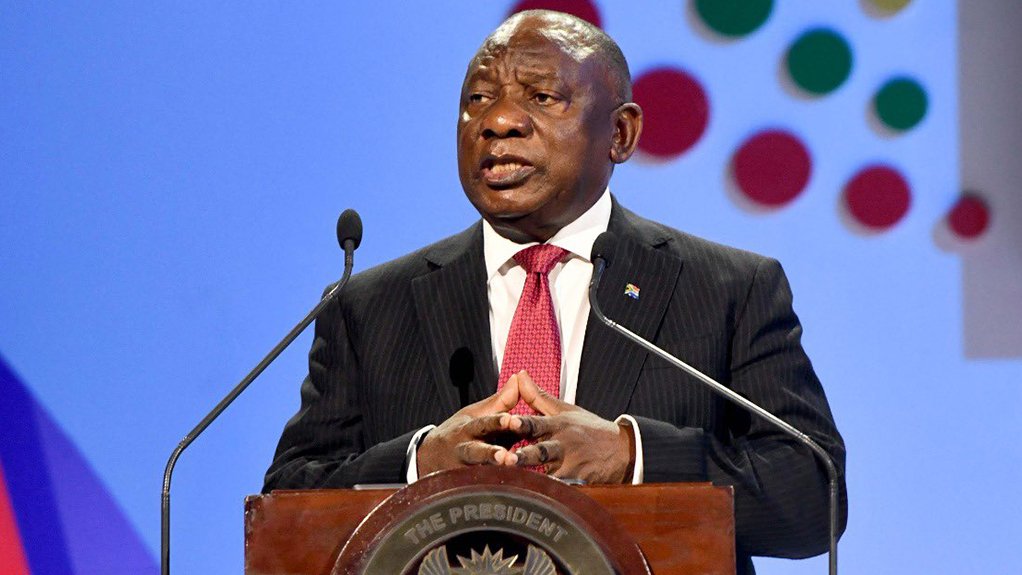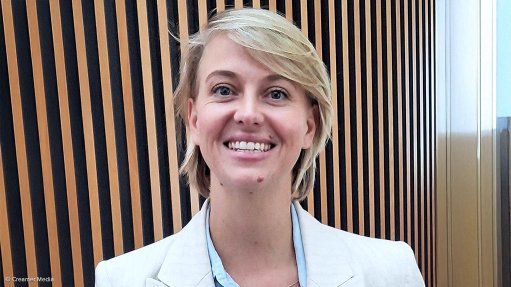Ramaphosa underlines commitment to energy and freight reforms as he unveils new R2tr investment target


President Cyril Ramaphosa at the fifth edition of the South African Investment Conference
President Cyril Ramaphosa unveiled a new investment target of R2-trillion for the five-year period to 2028 at the fifth edition of the South African Investment Conference on Thursday, where he also received new pledges from domestic and international investors that enabled him to confirm that the R1.2-trillion five-year target set in 2018 had been exceeded.
By the conclusion of the gathering, the President was able to confirm investment commitments for the period of R1.51-trillion and covering a diverse range of activities, from telecoms, mining and manufacturing, to economic and social infrastructure.
He argued that the achievement of the initial five-year target should be viewed as an opportunity to deepen collaboration and should also be used as "a springboard towards a recovered, reconstructed, inclusive new economy".
The 2023 event took place in a context of ongoing power cuts, which the President acknowledged were weakening confidence, tainting international perceptions about South Africa and undermining investment sentiment and decisions.
“The energy sector remains our foremost priority,” he told investors during an address that placed stress on the reforms being introduced to enable greater private sector participation in the electricity supply industry.
Ramaphosa announced that the reforms that facilitated the removal of the licensing threshold for embedded generation projects had already led to the development of a 10 GW-strong pipeline of mostly renewable-energy projects, about 8 GW of which were being pursued by South African mining companies.
This was partly reflected in the pledges made, with a total of 11 electricity-related investment commitments presented, including:
- a R108-million investment by ARTSolar to increase it solar panel production at its factory in KwaZulu-Natal;
- a R135-million investment by Ener-G-Africa to produce small solar panels and solar cooking appliances;
- the R3.8-billion in solar generation being developed by the Sola Group to supply Tronox’s minerals sands operations;
- a R580-million investment by Mahlako into three solar projects for Harmony Gold mines;
- an R800-million solar project by Chariot Transitional Power and Total Eren to supply the Tharisa mines in the North West province;
- a R1.35-billion commitment by Unigreen Energy of Russia to develop solar capacity in the North West province for private offtakers;
- Seriti Green Energy’s R4.5-billion project to develop a 155 MW wind project in Mpumalanga;
- a R1-billion investment in renewable energy by Toyota to supply its facilities in Gauteng and KwaZulu-Natal;
- ArcelorMittal South Africa’s R3-billion solar investment to supply electricity to its Gauteng steel operations;
- a R251-million project by Rheinmetall Denel Munition to develop a solar farm and a mobile green hydrogen facility to support its defence-related activities; and
- a R105-billion green hydrogen and green ammonia commitment by Hive Hydrogen for development at Coega, in the Eastern Cape.
Ramaphosa also said that in parallel with the work under way to close the electricity supply shortfall and end loadshedding, government was laying the foundation for a fundamental reform of the energy sector in the longer term, which would open opportunities for private investors.
“Cabinet has approved the Electricity Regulation Amendment Bill, which will soon be tabled in Parliament, to establish a competitive market for electricity generation.”
South Africa’s commitment to the Just Energy Transition Investment Plan and the target of achieving net zero emissions by 2050 was also reiterated against the backdrop of fresh uncertainty around both following recent comments by Electricity Minister Dr Kgosientsho Ramokgopa, who indicated that he was likely to propose a life-extension for the unreliable Eskom coal fleet as part of options he would be presenting to Cabinet for tackling loadshedding.
However, speaking at the conference Ramokgopa stressed that fixing Eskom’s coal stations represented but one of five pillars of the Energy Action Plan, with the others being the acceleration of embedded generation investment, making faster progress with the public procurement of renewables, batteries and gas, unbundling Eskom to ensure greater investment in the grid, and supporting rooftop solar and demand reduction.
Nevertheless, he still indicated that the Energy Action Plan, which he was appointed to implement, could be reviewed, while the President also injected a note of caution by saying that the just transition would be pursued “at a pace our country can afford and in a manner that advances our developmental objectives and ensures energy security”.
NATIONAL LOGISTICS CRISIS COMMITTEE
Ramaphosa also used his address to outline initiatives under way to address the crisis in the freight logistics sector, where Transnet’s railway and port constraints were “significantly affecting the mining, agriculture, forestry, automotive and manufacturing sectors”.
He announced that, following meetings with business and labour, it had been agreed that a National Logistics Crisis Committee be established to “drive the implementation of a comprehensive roadmap for the freight logistics sector”.
“Just as the private sector Resource Mobilisation Fund is providing support for the Energy Action Plan, we are greatly encouraged by indications from business that they are prepared to support government in our efforts to fix the logistics system.”
Ramaphosa also stressed structural reforms under way in the sector, including the new National Rail Policy, which provided for third-party access to the freight rail network.
“To facilitate third-party access, Transnet is establishing a separate Infrastructure Manager for the rail network.
“In the interim, Transnet is implementing a range of measures to arrest the decline in performance of the freight rail system, including to increase the availability of locomotives for key corridors.
“Transnet is also in the process of establishing private sector partnerships at the Durban and Ngqura Container Terminals, which we expect to be concluded in the coming weeks,” Ramaphosa said.
Article Enquiry
Email Article
Save Article
Feedback
To advertise email advertising@creamermedia.co.za or click here
Press Office
Announcements
What's On
Subscribe to improve your user experience...
Option 1 (equivalent of R125 a month):
Receive a weekly copy of Creamer Media's Engineering News & Mining Weekly magazine
(print copy for those in South Africa and e-magazine for those outside of South Africa)
Receive daily email newsletters
Access to full search results
Access archive of magazine back copies
Access to Projects in Progress
Access to ONE Research Report of your choice in PDF format
Option 2 (equivalent of R375 a month):
All benefits from Option 1
PLUS
Access to Creamer Media's Research Channel Africa for ALL Research Reports, in PDF format, on various industrial and mining sectors
including Electricity; Water; Energy Transition; Hydrogen; Roads, Rail and Ports; Coal; Gold; Platinum; Battery Metals; etc.
Already a subscriber?
Forgotten your password?
Receive weekly copy of Creamer Media's Engineering News & Mining Weekly magazine (print copy for those in South Africa and e-magazine for those outside of South Africa)
➕
Recieve daily email newsletters
➕
Access to full search results
➕
Access archive of magazine back copies
➕
Access to Projects in Progress
➕
Access to ONE Research Report of your choice in PDF format
RESEARCH CHANNEL AFRICA
R4500 (equivalent of R375 a month)
SUBSCRIBEAll benefits from Option 1
➕
Access to Creamer Media's Research Channel Africa for ALL Research Reports on various industrial and mining sectors, in PDF format, including on:
Electricity
➕
Water
➕
Energy Transition
➕
Hydrogen
➕
Roads, Rail and Ports
➕
Coal
➕
Gold
➕
Platinum
➕
Battery Metals
➕
etc.
Receive all benefits from Option 1 or Option 2 delivered to numerous people at your company
➕
Multiple User names and Passwords for simultaneous log-ins
➕
Intranet integration access to all in your organisation


















